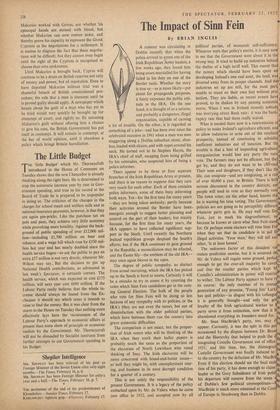The Little Budget
THE 'little Budget' which Mr. Thorneycfoft introduced in the House of Commons on Tuesday shows that the new Chancellor is already thinking along the right lines. He is determined to stop the automatic increase year by year in Gov- ernment spending, and true to his record at the Board of Trade he is prepared to be unpopular in doing so. The criticism of the changes in the charges for school meals and welfare milk and in national insurance payments, however, is that they are again pin-pricks. Like the purchase tax on pots and pans, they achieve very little economy while provoking more hostility. Against the back- ground of public spending of over £12,000 mil- lion—including £1,700 million on beer and tobacco, and a wage bill which rose by £350 mil- lion last year and has nearly doubled since the health service began—to ask the public to pay an extra £57 million is not very drastic, whatever Mr. Wilson may say., But the decision to put up National Health contributions, as advocated in last week's Spectator, is certainly correct. The health service, which was expected to cost £175 million, will next year cost £690 million. If the Labour Party really believes that the whole in- crease should always be found from the Ex- chequer it should say which taxes it intends to raise to find the money. But it was clear from the storm in the House on Tuesday that nothing more effectively lays bare the vacuousness of the Labour Party's approach to economic affairs at present than some show of principle or economic realism 'by the Government. Mr. Thorneycroft will not be dissuaded by Socialist tantrums from further attempts to cut Government spending in his Budget.










































 Previous page
Previous page